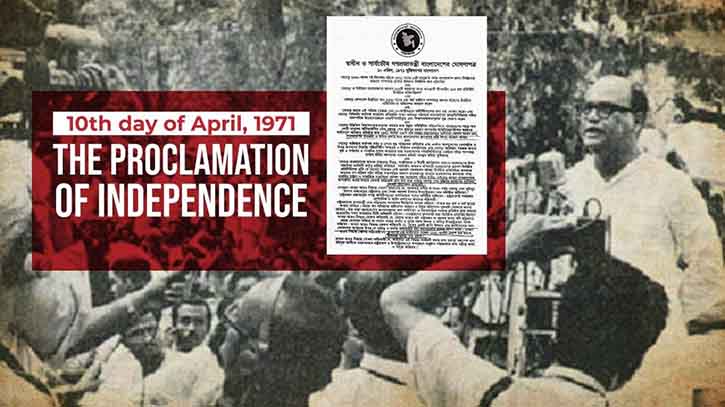
One notable feature of the 10 April’s Proclamation of Independence is that it has remained intact despite the political attacks on our liberation war documents by the Anti-Awami League forces throughout the ages. Thus, it stands still as a testament of time. The legal and political foundation of the Proclamation of Independence has been written down in the document itself: the unilateral declaration of independence by Bangabandhu Sheikh Mujibur Rahman, the Father of the Nation.
Dear Readers, please note that the Proclamation of Independence, a testament of 10 April happenings, mentions only one single individual: the central character of Bangladesh’s liberation struggle, Bangabandhu Sheikh Mujib. This article shall highlight the legal and political significance of 10 April’s Proclamation of Independence.
Before Bangladesh, many nations unsuccessfully tried to exercise their right to self-determination. Bangabandhu’s Bangladesh is the first country that was able to ensure its independence within only 9 months war by exercising its right to self-determination. Legally speaking, the foundation of Bangladesh was made legally bulletproof. The country Bangladesh was established on 26 March 1971 with the unilateral declaration of independence by Bangabandhu Sheikh Mujibur Rahman.
The 10 April’s Proclamation of Independence not only confirms and bases itself on the 26 March declaration of Bangabandhu but also gives a concrete shape of the new state. It did not stop at establishing a sovereign people’s republic but allocated powers and functions of the government befitting for a wartime government. The formation of a government showed the world that the Bangali nation has an organized government, and this made it easier for international community to communicate with an organized leadership. This is why the Proclamation of Independence is very significant in our national journey.
The subsequent judicial assessment of the Kosovo’s independence situation by the International Court of Justice only reiterated the Bangladesh’s practice of declaring independence. While that may sound easy to the present generation, a careful consideration of the circumstances reveals how difficult it was for the then leadership of Bangladesh to assess the proper legal method of declaring independence in the eye of international law.
Because there was no such precedence. Regardless of such challenges, the ‘high command’ formed by Bangabandhu Sheikh Mujib during the early days of March 1971 successfully gave directions to Barrister M Amirul Islam for drafting the Proclamation of Independence. This article notes the due thanks to famous barrister based in Kolkata, Mr. Subrata Roy Chowdhury who later wrote an internationally acclaimed book on Bangladesh’s lived legal experience in founding a new state.
The Proclamation of Independence is a complete document in the sense that it itself gives justifications for its existence. For example, it states the treacherous war imposed of the military juntas of Pakistan, bases itself on the universal declaration of independence pronounced by the legitimate leader of the country- Bangabandhu Sheikh Mujibur Rahman, mentions the genocidal acts by the occupation force in Bangladesh.
It promises to build a Bangladesh where ‘equality, human dignity and social justice’ is ensured. However, such an egalitarian document loses its legitimacy if the endorsement of Bangabandhu’s declaration of independence were absent. Because he was the principal architect of the liberation struggle of Bangladesh. Only he had the legitimate authority to unilaterally declare independence.
A principal reason Bangladesh received wide international support was that the Proclamation of Independence declared that the state would follow all the rules of international law and abide by all the obligations that devolve upon a state as a member of the United Nations. Thus, the international community understood that Bangladesh has all the good intentions to follow the rules of international relations. This document is the first document of Bangladesh that unequivocally declares that Bangladesh will be a committed observant of international law.
Unfortunately, after the 1971 War of Independence, the progressive forces of the country had to fight violent clashes to keep the history of the state intact. The Proclamation of Independence written on 10 April 1971 is a testament to the fact that it was Bangabandhu Sheikh Mujibur Rahman who declared the independence of Bangladesh. More importantly, no one else had the authority or legitimacy to declare a unilateral declaration of independence. Because in the words of the Proclamation of Independence, Bangabandhu Sheikh Mujibur Rahman was the ‘undisputed leader of the 75 milliom people of Bangladesh’.
The International Court of Justice in Kosovo case held that the person declaring the Unilateral Declaration of Independence must have the authority and legitimacy to do so. This requirement could not have been fulfilled without the 26 March declaration of Bangabandhu. Thus, independence would have remained a distant dream for 75 million people without Bangabandhu’s fearless call for independence on the historic 26 March.
Sheikh Wali Asif Enan is organizing secretary of the central committee of Bangladesh Students’ League. He recently completed his LLM from University Of Dhaka.








